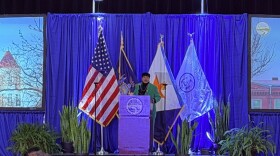New York Republican Committee Chairman Ed Cox said because the campaigns in both the Republican and Democratic races are so close, New York could play a pivotal role. He calls it the state's New Hampshire moment.
"It’s the first time in the history of the Republican presidential primaries in New York state that the primary really could make a crucial difference in who our nominee would be and who the next president of the United States would be," Cox said.
But, the Republican primary is unique in New York for another reason this year. The state GOP's Committee voted last June to change who appoints the delegates won by presidential candidates in the primary. Instead of just letting the candidates choose a group of supportive New Yorkers, the state's 456 GOP Committee members will elect the delegates. Cox said this was done to ensure local Republicans who put in a lot of work for their local party are chosen, and not just friends or family of the candidates.
"We changed that because often the candidate who would win the state would end up with a lot of delegates who really hadn’t worked hard in the party, weren’t a part of it, they were Republicans, but they weren’t really make the party work," Cox said.
That could make it more difficult for Trump to win at the National Republican Convention this summer if he doesn't get a majority of the vote on the first ballot. New York's delegates are only required to support their candidate in the first vote. So, they could abandon Trump for Sen. Ted Cruz or Gov. John Kasich for the second vote. Yet Cox said he still expects the candidates to compete for delegates when they are elected about two weeks after the primary.
"I have no doubt that the representative of the candidate who has won the delegates in the congressional district will be right there making the point saying, 'Look, I know these guys did hard work, but I want people who really are on our side. So, I prefer this one to that one.'"
The Democratic presidential candidates will be competing for 291 delegates, which will be awarded proportionally. Unlike in the Republican race, there are unpledged "superdelegates" who can support whomever they choose. Of New York's 44 unpledged delegates, made up of elected officials and party leaders, several have endorsed former New York Sen. Hillary Clinton, including Gov. Andrew Cuomo, Sen. Charles Schumer (D-NY) and Sen. Kirsten Gillibrand (D-NY).









